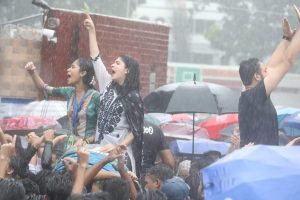The political scene in post-Hasina Bangladesh is in a massive churn. The once-powerful Awami League (AL) is in disarray. Its politics is in tatters and the party is facing a serious legitimacy crisis.
AL sources have told The Diplomat that the way former prime minister and AL chief Sheikh Hasina fled to India on August 5, without notifying party leaders and activists, has demoralized them. Moreover, in the eyes of the public, the AL government massacred students who led the people’s uprising against AL rule. Multiple judicial investigations are taking place to determine Hasina and the AL’s role in the serious human rights violations during the student-led uprising. In a nutshell, it will take time for the AL to revive its politics.
Against this backdrop, Bangladeshis are closely watching the politics of the Bangladesh Nationalist Party (BNP) and the Jamaat-e-Islami (JI). The two have been alliance partners in the past. Both have borne the brunt of AL crackdowns and share a hatred of the party.
Will their shared antipathy to the AL bring them together to form an alliance?
Their similar positions on some issues, notwithstanding, the BNP and JI have differences.
Founded by Mawlana Maududi in 1941, JI’s political philosophy is based on Islamic religious principles. According to a JI publication titled “An Introduction to Bangladesh Jamaate Islami,” it aims to turn Bangladesh into an Islamic welfare state. Maududi advocated for Islamic governance and enforcement of Sharia law.
However, JI’s political philosophy stands at odds with that of the BNP. Tarique Rahman, the acting chairman of BNP and the party’s de facto leader, has previously said that “politics may be influenced by religion but the framework of politics must not be based on religion.” This underscores a significant ideological distinction between BNP and Jamaat.
Differences have come to the fore in recent months. Soon after the Muhammad Yunus-led interim government was set up and after Yunus’s first speech to the nation, the BNP pressed for a clearer roadmap for elections.
Jamaat Emir (chief), Shafiqur Rahman publicly derided the BNP for calling for elections even as the Bangladeshi people were yet to recover from the AL government’s brutal repression of the protests. “Still, hundreds of people are writhing in pain on hospital beds. The bloodstains haven’t been wiped away….in such a time, if someone starts chanting about elections, the nation will not accept it,” Rahman said.
The BNP hit back.
“Those who lack public support… those who don’t have the ability to win votes are the ones opposing the election,” BNP Secretary General Mirza Fakhrul Islam Alamgir said. In an interview with a local newspaper, Alamgir stressed that BNP and Jamaat are not in an alliance anymore as the alliance became dysfunctional long ago.
Members of both parties are downplaying their differences.
Nakibur Rahman, a U.S.-based scholar, who is a rukon or permanent member of the JI, told The Diplomat that the rhetorical disagreement between BNP and Jamaat is nothing serious. These are indications that both parties believe in democracy and democratic values of public discussion. “We appreciate that BNP is still the largest party in the county,” he said.
However, it is becoming increasingly evident that the BNP-JI tactical cooperation in recent years has run its course and it is a matter of time before the two parties formally part ways and compete against each other.
Maududi rejected the Western democratic system. However, post-Maududi, the JI began participating in elections. It contested elections up until 2008. The BNP and Jamaat formed an anti-AL electoral and political alliance in January 1999. That alliance later expanded into a 20-party alliance in 2018. JI was even part of the BNP-led government between 2002-2006 and held two ministries during this period.
Both, the BNP and JI boycotted the 2014 and 2024 general elections held under Hasina’s government. They said that under Hasina elections would not be free and fair. Yet Hasina went ahead with holding a one-sided election. Although the BNP and JI participated in the 2018 elections, that election was heavily rigged by Hasina.
Both the BNP and JI were subjected to a relentless campaign by the AL when it was in power in the 2009-24 period. The AL aimed to project itself to external observers as the secular political force in Bangladesh, and the BNP-Jamaat as the radical religious force, although research shows AL invested much more state finance in Islamic values and culture than any other party in the history of Bangladesh, and even aligned with Islamist parties.
According to Bangladeshi media, the distance between the BNP and JI began to grow after the 2018 election. In 2022-23, BNP’s Rahman led from his home in exile in the U.K. a series of massive rallies on the streets of Dhaka and other cities. The JI did not participate in these rallies and was thought to be purposefully sidelined by the BNP.
AKM Wahiduzzaman, BNP’s Information and Technology Affairs Secretary told The Diplomat that the alliance between BNP and JI was more of a strategic one. “Our alliance has been driven by political pragmatism, not shared ideology…the two parties have continued anti-Hasina campaigns through mutual consultations.”
It is becoming evident that there will be no BNP-JI alliance in the next general elections. This underscores a new political future for Bangladesh, according to Tasneem Khalil, editor-in-chief of Netra News, a Sweden-based, Bangladesh-focused investigative news site.
“Bangladesh will see the BNP leading liberal democratic forces in Bangladesh with the Jamaat leading the conservative and radical right political forces in the country,” Khalil said.
Time will decide whether Khalil is right but for now, as Bangladesh’s political landscape rapidly changes, BNP and Jamaat politics in the post-Hasina period reflect a reconfiguration and reset in thoughts about the political future of the country.

































